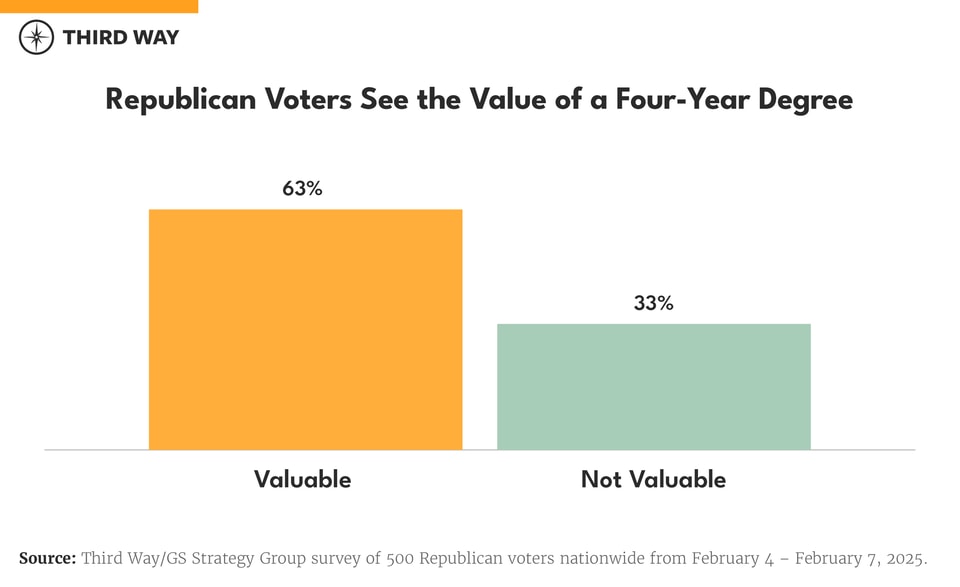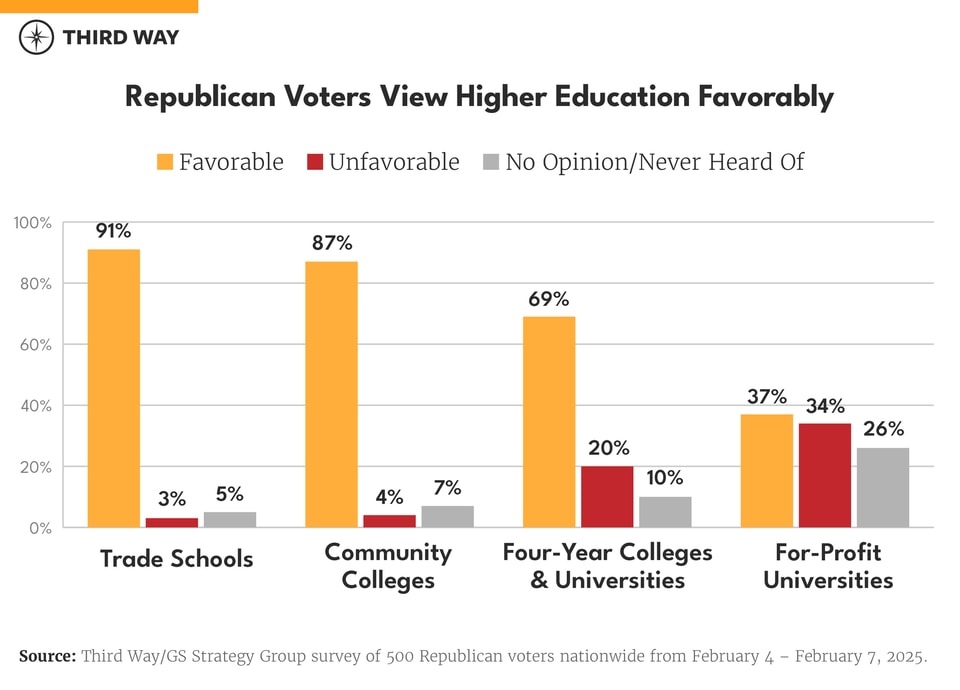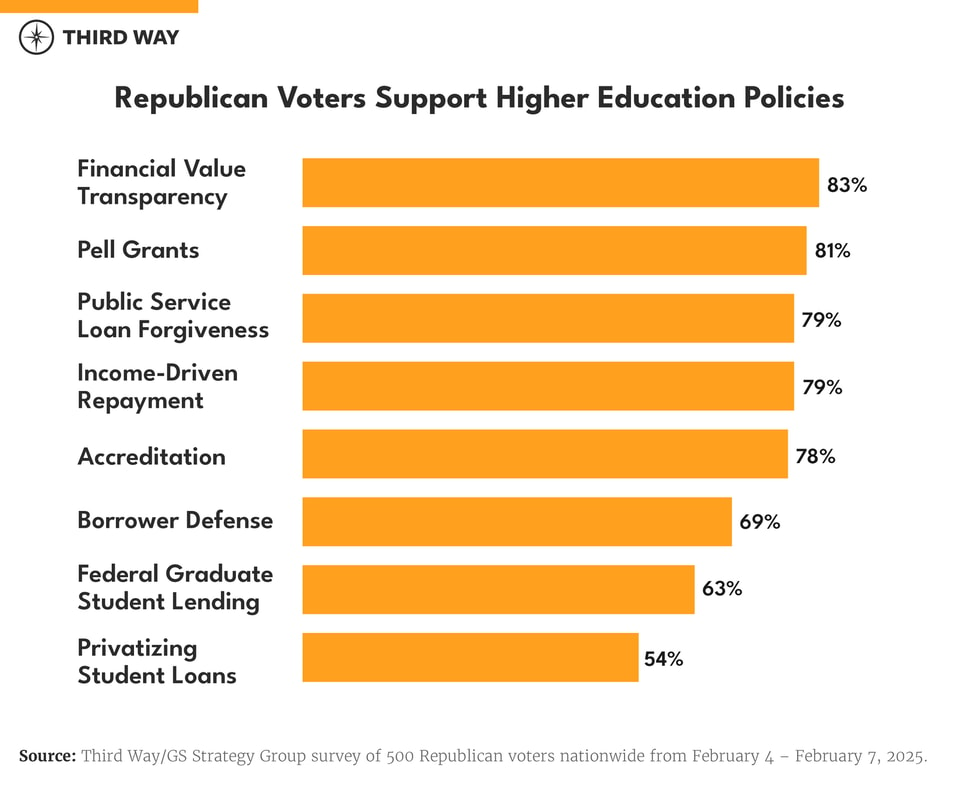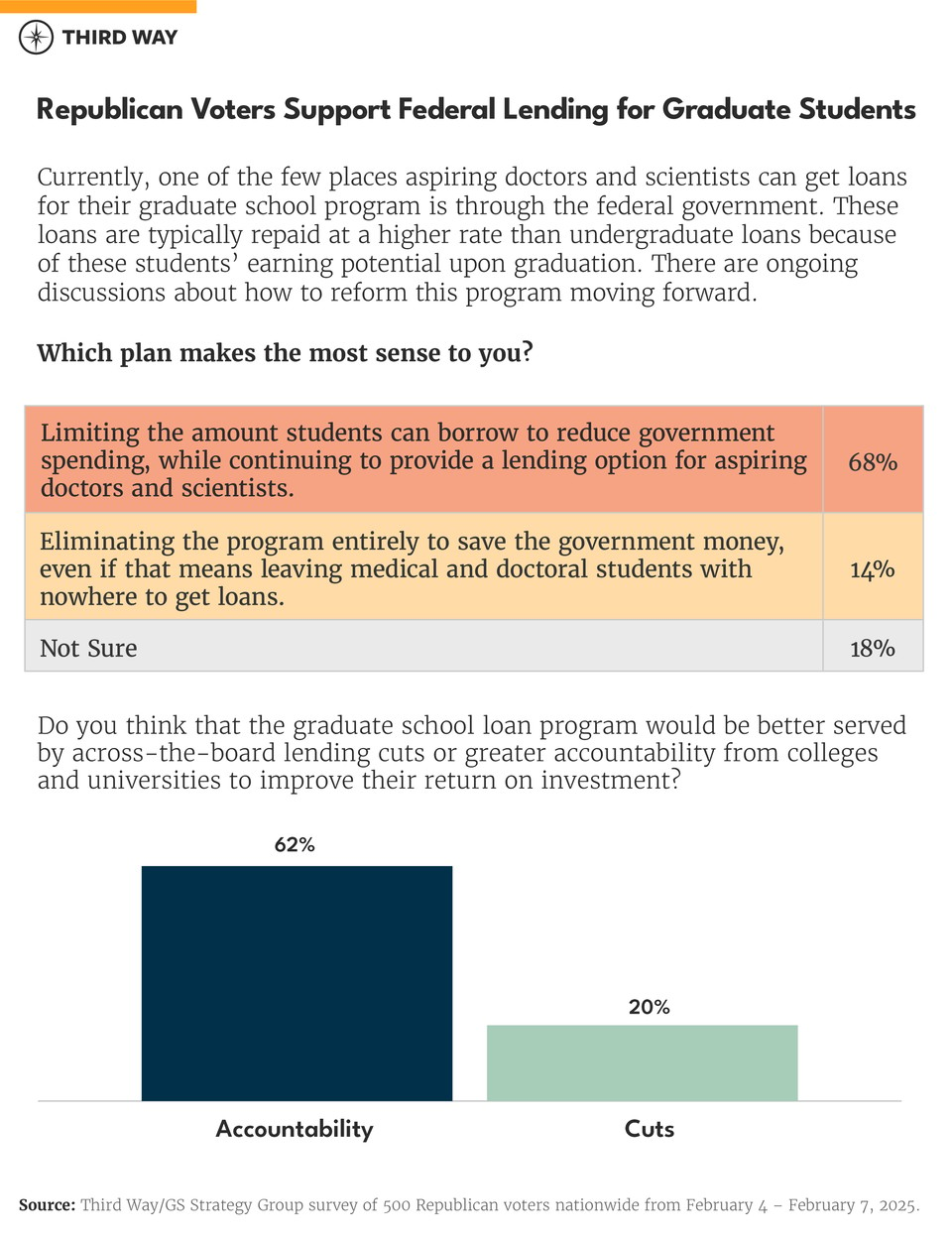Memo Published March 6, 2025 · 7 minute read
What Do Republican Voters Want on Higher Education
Ben Cecil


More from this series Repository of Third Way’s Higher Education Public Opinion Research
View seriesTakeaways
- Despite frustrations with the system, Republican voters have not abandoned higher education. They do not view colleges and universities as an enemy, and they believe in the value of a degree.
- Republicans broadly support several of the programs Congress is targeting for cuts in reconciliation.
- They also do not want to see student loans privatized or federal lending eliminated.
Voters sent Republicans to Washington with a trifecta this year, and with that backdrop, Congress is now considering cuts across various areas, including higher education. In partnership with Republican polling firm GS Strategy Group, Third Way dug in to ask what 500 Republican voters nationwide want to see as it relates to higher education and explore their thoughts on the policies under consideration.1 As the following analysis shows, Republican voters like higher education, are signaling a preference for less invasive reforms, and broadly support policies that will make higher education more affordable and hold colleges and universities accountable.
Republican Voters Haven’t Abandoned Higher Education
Conventional wisdom would lead you to believe that Republican voters are skeptical about higher education and question the value of a four-year degree. Yet voters told us a different story: when asked if they think a four-year college degree is “valuable” or “not valuable” in today’s economy, 63% of Republican voters agreed that it is valuable, as did 60% of those with a “very favorable” perception of President Trump.

Republican voters also generally like colleges and universities. Nationally, there’s a sky-high favorability rating for trade schools (91%) and community colleges (87%). And nearly seven in ten Republican voters (69%) have a favorable opinion of four-year colleges and universities—with 35% holding a “very favorable” perspective. The only institutional type that Republican voters don’t fully support is for-profit colleges and universities, which have a 34% “unfavorable” rating.

While Republican voters support higher education, they also see areas for increased accountability. In fact, 87% think that more accountability is needed (with 57% saying “much more” is required). Republicans also connect the dots between the federal government’s involvement in higher education and protecting the investment of their taxpayer dollars. Seventy-one percent of Republican voters believe that the federal government should continue to play a role in higher education by requiring transparency from institutions and accrediting schools and programs based on their value to students. And 71% also agree that with the ever-increasing cost of college, the federal government must provide guardrails against bad actors who charge students for worthless degrees that won’t help them get a job. Republican voters want federal investment and oversight in higher education to promote value and keep the focus on students getting high-paying jobs—and 48% support withholding taxpayer dollars if colleges and universities don’t provide a return on investment to students who enroll.
Republican Voters Favor Policies That Reduce Costs and Protect Access
When asked about what is most needed to reform higher education, just under half of Republican voters (48%) said that affordability is the most significant thing needed in higher education today. That’s no surprise—next to a home, college is one of the most expensive investments a student and their family make in their lifetime, and taxpayers want to see a return on their investment and that higher education’s juice is worth the squeeze. Another third see accountability as their top reform priority, a figure that jumps to 42% among self-identified “very conservative” Republicans. Across the board, Republicans are looking for additional accountability from public institutions—with 90% wanting more accountability from the federal government and 87% wanting more from colleges and universities.
As Republican voters told us, lowering costs and holding colleges accountable can go hand in hand—and many of the policies proposed for cuts are well-supported by majorities of Republican voters. This includes policies that promote affordability, protect students from predatory institutions, make student loan repayment less burdensome, and hold institutions accountable without negatively impacting students.

- 83% of Republicans support Financial Value Transparency. Republicans want to see the Financial Value Transparency (FVT) rule come to fruition, noting that this information will help students and families determine which college program would provide the best return on their investment before enrolling. Even with the higher education lobby’s ferocious advocacy to slow the FVT rule, Republican voters see FVT and its connection to value, accountability, and ROI.2
- 81% of Republicans support Pell Grants. Republican voters want continued financial support for the Pell Grant program, which helps low- to moderate-income students access higher education. The Pell Grant program faces a dangerous shortfall as soon as Fiscal Year 2026, and Republican voters want to see the Pell Grant program continue to be supported—not in the crosshairs.3
- 79% of Republicans support Public Service Loan Forgiveness (PSLF). For Americans who dedicate their careers to public service positions like the military, law enforcement, or public school teachers, PSLF allows for earned loan forgiveness after working in such fields for a certain amount of time and making a required number of payments. Over half (55%) of public servants who have received PSLF since October 2021 come from states that voted for President Trump.4
- 79% of Republicans support income-driven repayment for student loans. Even though the future of the Saving on a Valuable Education (SAVE) student loan repayment plan is in legal jeopardy, Republican voters do want loan repayment options that make repaying student loans more affordable and help prevent default. Republican Senators recognize this need, and their SAVE for Students Act would codify an income-driven repayment plan and require colleges and universities to demonstrate that their former students can pass a reasonable earnings threshold test to receive federal loan dollars.5
- 79% of Republicans support accreditors considering student outcomes. Republican voters want to see college accreditors considering student outcomes, such as graduation rates, loan repayment rates, and post-college employment, as a part of their review of institutions. Considering student outcomes is a surefire way to help Americans feel more confident that accreditation is the proverbial seal of approval for quality—and hold institutions to task when they miss the mark.6
- 69% of Republicans support borrower defense to repayment. Republicans support the ability for student loan borrowers whose institutions engaged in fraud, misrepresentation, or illegal conduct to have their loans discharged through borrower defense to repayment. Nationally, nearly six in ten (59%) borrowers with approved borrower defense claims live in red states. Texas, Florida, and Georgia comprise three of the top five states with the most approved claims.7
Republicans Don’t Want Massive, Expensive Changes to the Student Loan Program
Some conservative voices have proposed moving all federal lending to the private market as an antidote to reforming the student loan program.8 While it may sound to some like the appropriate corrective reaction, Republican voters aren’t so sure. Of the 12 policy reforms we tested, fully privatizing student loans ranked number 11—nearly last and almost 30 percentage points lower than the top-supported policy. For a proposal many promote as a possible solution, barely half (54%) of Republican voters view it as a viable option.
That same ethos holds as Congress approaches reforms to graduate student loans. Some have called for instituting caps on graduate lending or eliminating the Grad PLUS loan program.9 Yet Republican voters recognize that federal lending is one of the few options for aspiring doctors and scientists to access needed funding to help pay for their advanced training. Nationally, 68% of Republican voters support limiting how much students can borrow through Grad PLUS to reduce government spending over proposals to eliminate the program.10 And most Republican voters (62%) would prefer increased accountability for institutions to improve their return on investment over across-the-board cuts to graduate lending.

Conclusion
Most Republican voters support making higher education more affordable and holding colleges and universities accountable. Yet many of these policies are being considered for cuts as budget reconciliation heats up. Republican voters see the connection of strong policies that shore up the things they want to see from higher education—and want to see them continued as a surefire way to ensure value for their taxpayer dollars. As Congress considers where to trim the budget this year, it’s important to remember that Republican voters aren’t looking for higher education cuts but rather a renewed emphasis on making it more affordable and holding institutions to the line for delivering a return on investment.
Methodology
GS Strategy Group conducted an online and phone (50% each) survey between February 4 and February 7, 2025. The sample included 500 likely Republican voters nationally; the margin of error is +/- 4.38%.
To view the topline results, click here.
